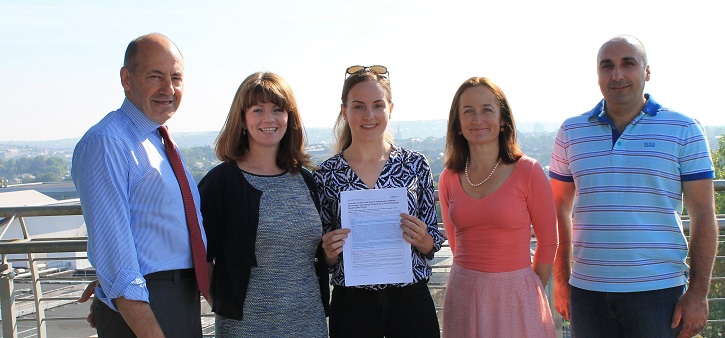2014 Press Releases
UCC research into caesarean sections

Caesarean section is associated with a slightly increased rate of subsequent stillbirth and ectopic pregnancy, according to a large study of women living in Denmark, published in PLOS Medicine
Given the global increase in Caesarean rates, the results of the study (conducted by Louise Kenny and colleagues from University College Cork, Ireland and Aarhus University, Denmark) are of interest to pregnant women, their partners and healthcare providers.
The researchers obtained data for 832,996 women from Danish national registers regarding their first live birth (including whether they had a Caesarean section) and then followed the women until they had a stillbirth, miscarriage, ectopic pregnancy or a second live birth. The researchers then used statistical modelling to estimate the rate of pregnancy complications following a Caesarean section compared to vaginal delivery. The analyses were controlled for the possibility that Caesarean sections were performed because of an indication of underlying complications of pregnancy.
Researchers found women who had a Caesarean section had a 14% increased rate of stillbirth in their next pregnancy compared to women who had a vaginal delivery, corresponding to an absolute risk increase of 0.03%. In other words, 3333 women would need to have a Caesarean to result in one extra stillbirth. Compared to vaginal delivery, having a Caesarean section increased the risk of a subsequent ectopic pregnancy by 9% (an absolute risk increase of 0.1% and a number needed to harm of 1000) but did not increase the rate of subsequent miscarriages.
The researchers are keen to reassure expectant mothers that the overall risk of a subsequent stillbirth or ectopic pregnancy, whilst elevated, remains small. Professor Kenny said “The findings of the current study are particularly important for expectant mothers as well as healthcare professionals as Caesarean section rates are increasing significantly worldwide. Whilst we showed that a previous Caesarean section is associated with a subsequent stillbirth and ectopic pregnancy, the overall risk of either is very low”
They add: “Furthermore, the findings will better inform women of the benefits and risks associated with all modes of delivery… while the hazard rate is small, women ‘electing’ Caesarean section without any medical necessity should consider all options thoroughly.”
The findings from this study arose from Dr Sinéad O’Neill's PhD research into mode of delivery and subsequent pregnancy outcome where she collaborated with researchers from the National Centre for Register-based Research (NCRR) in Aarhus, Denmark. Dr O'Neill is the recipient of a four year scholarship on the prestigious Health Research Board Ireland PhD Scholars programme (http://www.sphereprogramme.ie/) and was funded by the National Perinatal Epidemiology Centre (NPEC) in UCC (http://www.ucc.ie/en/npec/). Sinéad was co-supervised by Professor Richard Greene of the NPEC, Professor Louise Kenny and Dr Ali Khashan of INFANT centre [the Irish Centre for Fetal and Neonatal Translational Research] (http://www.infantcentre.ie) and Professor Patricia Kearney of the Department of Epidemiology and Public Health, UCC (http://www.ucc.ie/en/epid/).
